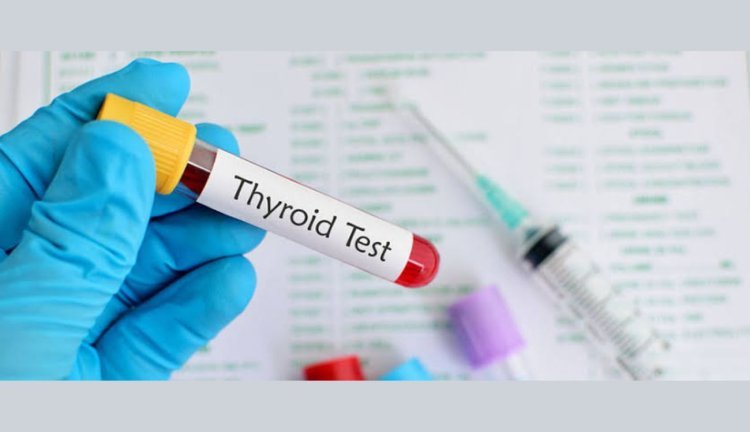Thyroid Blood Test: Types, Normal Levels, and Analysing Results
Thyroid blood tests are essential to diagnose how your thyroid gland is working. The test includes TSH, T3, T4, and antibody tests. The tests are vital as the thyroid gland helps your body to do important functions like utilising energy, heart and muscle function, and more.

Our body relies on a network of glands to maintain optimal function, and among them, the butterfly-shaped thyroid gland located in the neck, just above the breastbone, plays a significant role. This gland produces hormones that intricately regulate our body's energy utilization. Your doctor uses Thyroid function test to assess how well your thyroid gland functions. These tests can help diagnose various illnesses and assess overall health.
Types of Thyroid Tests
There are several types of thyroid tests, but they all fall under two categories:
- Thyroid Blood Test: Thyroid Blood Test assesses both hormones and antibodies related to the thyroid. It aids in the diagnosis of conditions like hypothyroidism (underactive thyroid) or hyperthyroidism (overactive thyroid). The panel typically includes TSH (thyroid-stimulating hormone), T3, T4, and thyroid
- Thyroid Imaging Tests: Thyroid Imaging Tests focus on identifying any irregularities or growths in the neck, determining whether they are benign or cancerous. One such method involves nuclear imaging, wherein a small amount of contrast material, such as iodine, is introduced through injection or ingestion. This procedure helps obtain detailed images of the thyroid for accurate
Want to get your story featured as above? click here!
Want to get your story featured as above? click here!
Test Details
- TSH: TSH test is usually the first one that doctors recommend. The pituitary gland in our body produces TSH, which then signals the thyroid gland to produce T3 and
- T3: T3 measures the level of triiodothyronine in your blood. This hormone is one of the two main hormones the thyroid gland
- T4: T4 measures the level of thyroxine in your blood. This hormone is the other main hormone produced by the thyroid
- Thyroid Antibody Test: Thyroid Antibody Test indicates whether you have thyroid antibodies in your blood, suggesting an autoimmune disorder like Hashimoto’s or Graves’
Symptoms of Thyroid Disorders
Recognising these symptoms can be crucial for timely diagnosis and management. Hypothyroidism
- Fatigue: Persistent lack of energy and
- Feeling Cold: Sensation of coldness, even in warm
- Constipation: Difficulty in passing stool, often accompanied by
- Absent or Irregular Periods: Menstrual cycle changes or
- Slow Height Growth: Reduced growth rate in height for
- Dry Skin: Skin may become dry, rough, or
Hyperthyroidism
- Weight Loss: Unintended and rapid loss of body
- Irregular Menstrual Cycles: Changes in menstrual
- Fast Heartbeat: Increased heart rate or
- Sweating: Excessive perspiration, often unrelated to physical
- Diarrhoea: Frequent and watery bowel
Interpreting Results
Thyroid tests reveal the health and functioning of your thyroid gland. The TSH test provides the most insight into your thyroid function. T3 and T4 levels are also important, but TSH is a key indicator of thyroid issues.
- A high TSH level indicates low thyroid hormone levels, meaning you have hypothyroidism or an underactive thyroid. In response, your pituitary gland produces extra TSH to correct the abnormal
- A low TSH level indicates high hormone levels in the blood, suggesting As a result, your pituitary gland stops releasing TSH into your blood.
- High T4 levels indicate hyperthyroidism, while low T4 levels suggest In some cases, high T4 levels might be due to pregnancy, other illnesses, health problems, or certain medications.
|
TSH Reference Ranges |
Levels |
|
Subclinical Low Thyroid Function |
4.7 to 10 mU/L |
|
Symptomatic Low Thyroid Function |
10 mU/L or higher |
|
Subclinical Overactive Thyroid Function |
0.1 to 0.5 mU/L |
|
Symptomatic Overactive Thyroid Function |
0.1 mU/L and lower |
|
Low T3 + High TSH |
Low Thyroid Function |
|
High T3 + Low TSH |
Overactive Thyroid |
|
Further Interpretation Based on TSH and T4 Levels |
|
|
Normal Thyroid Function |
Normal TSH + Normal T4 |
|
Potential Underactive Thyroid Risk |
High TSH + Normal T4 |
|
Overactive Thyroid |
Low TSH + High T4 |
|
Underactive Thyroid |
High TSH + Low T4 |
|
Thyroid Function Affected by Other Issues (e.g., Pituitary Gland Dysfunction) |
Low TSH + Low T4 |
In conclusion, interpreting Thyroid function test results can be complicated. Entrusting the expertise of your healthcare provider is paramount for a precise comprehension. Fortunately, thyroid disorders are widespread and manageable. Your healthcare provider can engage in a comprehensive discussion regarding potential treatment options to address and control your condition effectively.
If you require a test, don't delay any further. Take a proactive step by checking out our thyroid test prices




































.jpeg)


































































































